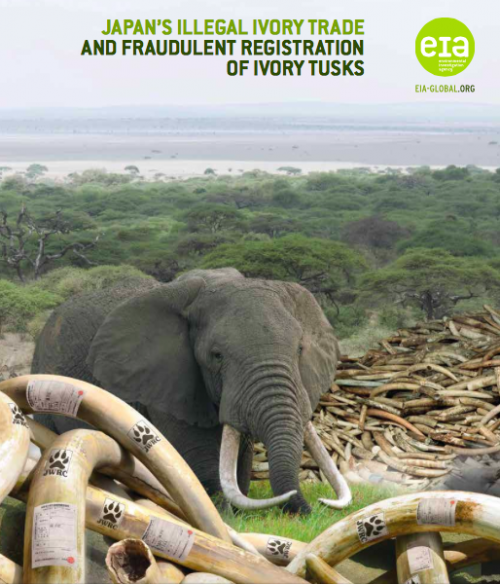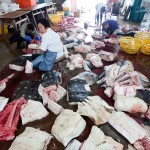
TOKYO — Japan’s ivory tusk registration system is awash with fraud, fueling illegal ivory trade and undermining international action to protect Africa’s disappearing elephants under pressure from intense ivory poaching.
In a new report launched today, the Environmental Investigation Agency (EIA) reveals that over 5,500 tusks have been registered, de facto legalized, in the last four years in Japan as demand for ivory has surged. More than 14,400 tusks have been registered since 1995, excluding ivory legally imported from two CITES approved auctions in 1999 and 2009.
In accordance with its obligations under the Convention on International Trade in Endangered Species (CITES), Japan agreed to require that all whole ivory tusks imported prior to the 1989 CITES international ivory trade ban and entering trade within Japan be registered with the government. Japan also agreed to require proof of legal origin and acquisition prior to registration. Rigorously applied, the registration system is intended to prevent illegal ivory from entering Japan’s market.
But an undercover investigation by EIA found Japanese ivory traders routinely willing to undertake illegal activities to evade the law in order to secure tusk registration.
In its new report, Japan’s Illegal Ivory Trade and Fraudulent Registration of Ivory Tusks, EIA reveals widespread abuse of loopholes in the Japanese government’s tusk registration system. Of 37 ivory traders surveyed, 30 offered to engage in illegal or fraudulent activities including purchasing and processing unregistered tusks of unknown origin or registering tusks using false information.
Common responses from the surveyed ivory traders included: “We must lie on these statements,” and, “If you want a [registration] certificate you can’t tell the truth.”
EIA’s findings refute Japan’s carefully cultivated image as a model of domestic ivory control.
“Japan’s weak wildlife law does not require a shred of real evidence for tusk registration,” said Danielle Fest Grabiel, EIA’s Senior Wildlife Policy Analyst. “The system is wide open to abuse and laundering of illegal ivory into the legal market.”
Japan’s Law for the Conservation of Endangered Species allows tusks to be registered on presentation of official documents, such as customs forms, and on the basis of declarations by the tusk owner and a neighbor or family member. However, the Japanese Ministry of Environment’s stated policy, and routine practice, is to allow tusks to be registered on the basis of declarations alone. EIA’s report shows that the submission of fraudulent declarations is a common practice by traders.
Revelations of rampant fraud in the Japanese system coincide with a rapid rise in ivory trade in Japan and a poaching epidemic in Africa, where more than 30,000 elephants are being slaughtered each year for their tusks.
“Africa’s elephants are paying for Japan’s shocking failure to enact its legal commitments to enforce rigorous controls to prevent illegal ivory trade,” said Allan Thornton, President of EIA.
“Only a ban on Japan’s domestic ivory trade and permanently ending registration of tusks can rectify the damage.”
In a separate investigation, EIA found millions of dollars of ivory offered for sale in ads or auctions on Japan’s leading e-commerce and auction websites – Yahoo! Japan and Rakuten Ichiba. While online domestic ivory trading is not illegal in Japan, the internet trade operates without meaningful government oversight. From 2012 to 2014 alone, more than 800 whole tusks and large quantities of cut ivory, together weighing over 12 tonnes, were sold on the Yahoo! Japan Auctions site.
EIA’s report urges the Japanese government to end rampant fraud and abuse by banning all domestic trade in ivory and registration of whole tusks with immediate effect.
“We are calling on the Government of Japan to join President Obama and the United States in responding to the appeals of African nations to protect their remaining elephants,” said Thornton. “To do this, Japan must enact a total ban on domestic ivory trade and permanently end its registration scheme.”
EIA is also appealing to Rakuten Ichiba and SoftBank, which owns Yahoo! Japan, to ban all online ads or auctions from offering elephant ivory for sale.




